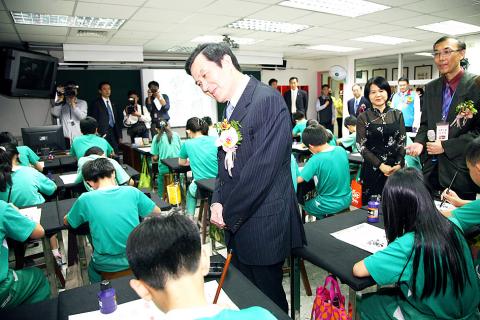Taiwan will not avoid cross-strait political issues, but the time is not right for political talks with China, President Ma Ying-jeou (馬英九) said yesterday amid concerns about possible moves by his administration toward political negotiations with Beijing.
In an interview with the Washington Post, Ma said the government did not intend to pass the political issues on generation to generation when asked to comment on Chinese President Xi Jinping’s (習近平) call for Taiwan to prepare for political negotiations.
He said for the two sides of the Taiwan Strait to engage in political talks and discuss the signing of a peace accord, his administration would seek a clear public consensus on the issue, while reiterating his principle in handling cross-strait issues, which is to address the easier and pressing issues first, before tackling difficult ones, such as politics.

Photo: CNA
“We are willing to discuss any issue as long as it is an urgent one,” he said.
He also dismissed a direct meeting with Xi during his term, insisting that such a meeting could only take place with the support of the Taiwanese public.
While insisting on an “economics first, politics later” policy for dealing with China, Ma said the government would not avoid addressing political issues.
Citing the signing of cross-strait agreements and the proposed establishment of cross-strait representative offices, Ma said these issues carried some political significance, and the government is also promoting the service trade agreement to enhance cross-strait exchanges and enable Taiwanese to profit from them.
He dismissed concerns about the nation’s sovereignty under fast-paced cross-strait development, and attributed the nation’s economic pacts with Japan and other major trade partners to improved cross-strait relations.
“They say we are selling out Taiwan and that we lost something, but they never say what exactly we have lost,” he said.
Ma also defended Taiwan’s relations with the US during his term, and said it was vital that Washington continued to sell arms to Taiwan.
He shrugged off his record-low approval rating, and said he has no desire to change cross-strait and domestic policies, insisting that the nation has made progress in every area, he said.
“Not everyone understands this. But we have done what needed to be done, and we will keep doing so until the very end,” he said.
When asked about the political rift between him and Legislative Speaker Wang Jin-pyng (王金平), Ma — who doubles as Chinese Nationalist Party (KMT) chairman — said the KMT has remained united despite the incident, adding that the case regarding Wang’s alleged improper lobbying will be resolved in court.

MAKING WAVES: China’s maritime militia could become a nontraditional threat in war, clogging up shipping lanes to prevent US or Japanese intervention, a report said About 1,900 Chinese ships flying flags of convenience and fishing vessels that participated in China’s military exercises around Taiwan last month and in January last year have been listed for monitoring, Coast Guard Administration (CGA) Deputy Director-General Hsieh Ching-chin (謝慶欽) said yesterday. Following amendments to the Commercial Port Act (商港法) and the Law of Ships (船舶法) last month, the CGA can designate possible berthing areas or deny ports of call for vessels suspected of loitering around areas where undersea cables can be accessed, Oceans Affairs Council Minister Kuan Bi-ling (管碧玲) said. The list of suspected ships, originally 300, had risen to about

DAREDEVIL: Honnold said it had always been a dream of his to climb Taipei 101, while a Netflix producer said the skyscraper was ‘a real icon of this country’ US climber Alex Honnold yesterday took on Taiwan’s tallest building, becoming the first person to scale Taipei 101 without a rope, harness or safety net. Hundreds of spectators gathered at the base of the 101-story skyscraper to watch Honnold, 40, embark on his daredevil feat, which was also broadcast live on Netflix. Dressed in a red T-shirt and yellow custom-made climbing shoes, Honnold swiftly moved up the southeast face of the glass and steel building. At one point, he stepped onto a platform midway up to wave down at fans and onlookers who were taking photos. People watching from inside

Japan’s strategic alliance with the US would collapse if Tokyo were to turn away from a conflict in Taiwan, Japanese Prime Minister Sanae Takaichi said yesterday, but distanced herself from previous comments that suggested a possible military response in such an event. Takaichi expressed her latest views on a nationally broadcast TV program late on Monday, where an opposition party leader criticized her for igniting tensions with China with the earlier remarks. Ties between Japan and China have sunk to the worst level in years after Takaichi said in November that a hypothetical Chinese attack on Taiwan could bring about a Japanese

The WHO ignored early COVID-19 warnings from Taiwan, US Deputy Secretary of Health and Human Services Jim O’Neill said on Friday, as part of justification for Washington withdrawing from the global health body. US Secretary of State Marco Rubio on Thursday said that the US was pulling out of the UN agency, as it failed to fulfill its responsibilities during the COVID-19 pandemic. The WHO “ignored early COVID warnings from Taiwan in 2019 by pretending Taiwan did not exist, O’Neill wrote on X on Friday, Taiwan time. “It ignored rigorous science and promoted lockdowns.” The US will “continue international coordination on infectious